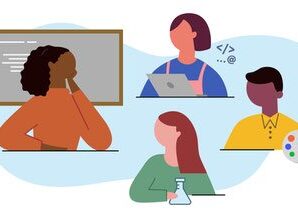
About This Course
Every day, teachers make thousands of decisions: what content to teach, what activities to assign, who to call on, how to respond to a student question, how to react to student behavior. These day-to-day decisions can have an enormous effect on the lives of young people, for good and ill. They can open new doors or cause lasting harm; they can make students feel seen and valued, or dampen their interest in school. In this course, we will investigate these interactions, rehearse responding to difficult scenarios, and develop a set of equity teaching mindsets and practices to support all of our learners, especially underserved students. With colleagues from your school or organization and online learners around the world, you will participate in four cycles of inquiry, practice, and action, and then complete a final action project. In each cycle of inquiry, you will examine and re-examine dimensions of inequality through educator mindsets, imagine community change through documentary case studies, rehearse taking action in thorny situations through digital practice spaces, and begin to lead change through action-oriented assignments. Our early investigations will focus on relationships and interactions with individual students, and pan out to examine the effects of bias on classrooms, schools, and communities. As you complete activities with peers online, you will develop a rich set of resources and exercises to use with your students and colleagues in your local context. At the end of the course, you will have a better understanding of yourself and your students, new resources to draw on for helping all students thrive, and an action plan for working in your school community to advance the lifelong work of equitable teaching.
Course Overview
Unit 1: Mindsets and Practices for Equity Teaching Introduction to educator mindsets for seeing sources of bias and inequality, discussing identity and practices for more equitable teaching. Unit 2: Seeing and Valuing Individuals through an Equity Lens Developing an imagination for how every individual student can learn and grow. Unit 3: Seeing and Valuing Students through Asset Framing Rethinking classroom instruction through asset framing. Unit 4: Seeing and Valuing Differences through Challenging Conversations Acknowledging and discussing our differences while connecting to our shared humanity. Unit 5: Addressing Inequality in a Community Context Understanding young people in a whole context that acknowledges structural inequality and histories of discrimination. Unit 6: The Lifelong Work of Equity Teaching Engaging students and colleagues in the work of equity teaching through mindsets and practice spaces.
What You'll Learn
Course Resources
Practice Space Facilitator Guides Becoming a More Equitable Educator: Course To-Go Becoming a More Equitable Educator: Reading and Resources List
Course Videos
Learn how schools have benefited from a graduate profile development process and begin the process yourself.
How do we prepare K-12 students and learning communities to be as successful as possible? Come explore these questions and more in Design Thinking for Leading and Learning.
An Overview Of Competency-Based Education In Schools: Presenting Ideas, Inspiration, Strategies, And Challenges.







